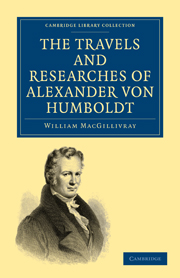 The Travels and Researches of Alexander von Humboldt
The Travels and Researches of Alexander von Humboldt Book contents
- Frontmatter
- PREFACE
- Contents
- CHAPTER I INTRODUCTION
- CHAPTER II VOYAGE FROM CORUNNA TO TENERIFFE
- CHAPTER III ISLAND OF TENERIFFE
- CHAPTER IV PASSAGE FROM TENERIFFE TO CUMANA
- CHAPTER V CUMANA
- CHAPTER VI RESIDENCE AT CUMANA
- CHAPTER VII MISSIONS OF THE CHAYMAS
- CHAPTER VIII EXCURSION CONTINUED, AND RETURN TO CUMANA
- CHAPTER IX INDIANS OF NEW ANDALUSIA
- CHAPTER X RESIDENCE AT CUMANA
- CHAPTER XI VOYAGE FROM CUMANA TO GUAYBA
- CHAPTER XII CITY OF CARACCAS AND SURROUNDING DISTRICT
- CHAPTER XIII EARTHQUAKES OF CARACCAS
- CHAPTER XIV JOURNEY FROM CARACCAS TO THE LAKE OF VALENCIA
- CHAPTER XV JOURNEY ACROSS THE LLANOS, FROM ARAGUA TO SAN FERNANDO
- CHAPTER XVI VOYAGE DOWN THE RIO APURE
- CHAPTER XVII VOYAGE UP THE ORINOCO
- CHAPTER XVIII VOYAGE UP THE ORINOCO CONTINUED
- CHAPTER XIX ROUTE FROM ESMERALDA TO ANGOSTURA
- CHAPTER XX JOURNEY ACROSS THE LLANOS TO NEW BARCELONA
- CHAPTER XXI PASSAGE TO HAVANNAH, AND RESIDENCE IN CUBA
- CHAPTER XXII VOYAGE FROM CUBA TO CARTHAGENA
- CHAPTER XXIII BRIEF ACCOUNT OF THE JOURNEY FROM CARTHAGENA TO QUITO AND MEXICO
- CHAPTER XXIV DESCRIPTION OF NEW SPAIN OR MEXICO
- CHAPTER XXV STATISTICAL ACCOUNT OF NEW SPAIN CONTINUED
- CHAPTER XXVI MINES OF NEW SPAIN
- CHAPTER XXVII PASSAGE FROM VERA CRUZ TO CUBA AND PHILADELPHIA, AND VOYAGE TO EUROPE
- CHAPTER XXVIII JOURNEY TO ASIA
CHAPTER XII - CITY OF CARACCAS AND SURROUNDING DISTRICT
Published online by Cambridge University Press: 29 August 2010
- Frontmatter
- PREFACE
- Contents
- CHAPTER I INTRODUCTION
- CHAPTER II VOYAGE FROM CORUNNA TO TENERIFFE
- CHAPTER III ISLAND OF TENERIFFE
- CHAPTER IV PASSAGE FROM TENERIFFE TO CUMANA
- CHAPTER V CUMANA
- CHAPTER VI RESIDENCE AT CUMANA
- CHAPTER VII MISSIONS OF THE CHAYMAS
- CHAPTER VIII EXCURSION CONTINUED, AND RETURN TO CUMANA
- CHAPTER IX INDIANS OF NEW ANDALUSIA
- CHAPTER X RESIDENCE AT CUMANA
- CHAPTER XI VOYAGE FROM CUMANA TO GUAYBA
- CHAPTER XII CITY OF CARACCAS AND SURROUNDING DISTRICT
- CHAPTER XIII EARTHQUAKES OF CARACCAS
- CHAPTER XIV JOURNEY FROM CARACCAS TO THE LAKE OF VALENCIA
- CHAPTER XV JOURNEY ACROSS THE LLANOS, FROM ARAGUA TO SAN FERNANDO
- CHAPTER XVI VOYAGE DOWN THE RIO APURE
- CHAPTER XVII VOYAGE UP THE ORINOCO
- CHAPTER XVIII VOYAGE UP THE ORINOCO CONTINUED
- CHAPTER XIX ROUTE FROM ESMERALDA TO ANGOSTURA
- CHAPTER XX JOURNEY ACROSS THE LLANOS TO NEW BARCELONA
- CHAPTER XXI PASSAGE TO HAVANNAH, AND RESIDENCE IN CUBA
- CHAPTER XXII VOYAGE FROM CUBA TO CARTHAGENA
- CHAPTER XXIII BRIEF ACCOUNT OF THE JOURNEY FROM CARTHAGENA TO QUITO AND MEXICO
- CHAPTER XXIV DESCRIPTION OF NEW SPAIN OR MEXICO
- CHAPTER XXV STATISTICAL ACCOUNT OF NEW SPAIN CONTINUED
- CHAPTER XXVI MINES OF NEW SPAIN
- CHAPTER XXVII PASSAGE FROM VERA CRUZ TO CUBA AND PHILADELPHIA, AND VOYAGE TO EUROPE
- CHAPTER XXVIII JOURNEY TO ASIA
Summary
Caraccas, the capital of the former captain-generalship of Venezuela, is more known to Europeans on account of the earthquakes by which it was desolated than from its importance in a political or commercial point of view. At the present day it is the chief city of a district of the same name, forming part of the republic of Columbia; though, at the time of Humboldt's visit, it was the metropolis of a Spanish colony which contained nearly a million of inhabitants, and consisted of New Andalusia, or the province of Cumana, New Barcelona, Venezuela or Caraccas, Coro, and Maracaybo, along the coast; and in the interior, the provinces of Varinas and Guiana.
In a general point of view Venezuela presents three distinct zones. Along the shore, and near the chain of mountains which skirts it, we find cultivated land; behind this, savannahs or pasturages; and beyond the Orinoco, a mass, of forests, penetrable only by means of the rivers by which it is traversed. In these three belts, the three principal stages of civilisation are found more distinct than in almost any other region. We have the life of the wild hunter in the woody district—the pastoral life in the savannahs—and the agricultural in the valleys and plains which descend to various parts of the coast. Missionaries and a few soldiers occupy advanced posts on the southern frontiers.
- Type
- Chapter
- Information
- The Travels and Researches of Alexander von HumboldtBeing a Condensed Narrative of his Journeys in the Equinoctial Regions of America, and in Asiatic Russia; Together with Analyses of his More Important Investigations, pp. 143 - 156Publisher: Cambridge University PressPrint publication year: 2009First published in: 1832


